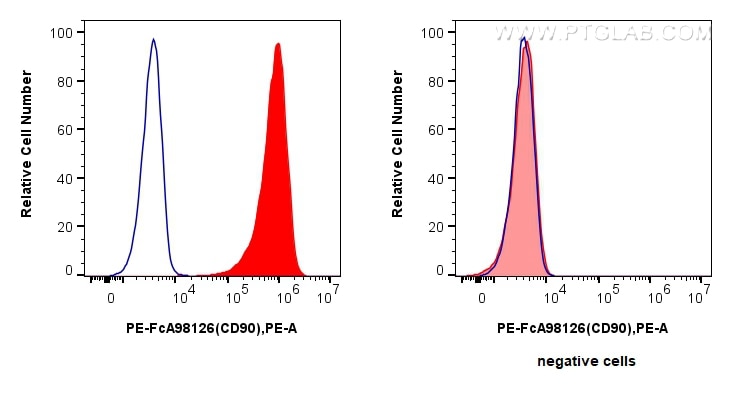Anticorps Recombinant de lapin anti-CD90
CD90 Recombinant Antibody for FC
Hôte / Isotype
Lapin / IgG
Réactivité testée
Humain
Applications
FC
Conjugaison
PE Fluorescent Dye
CloneNo.
241290B2
N° de cat : PE-FcA98126
Synonymes
Galerie de données de validation
Applications testées
| Résultats positifs en cytométrie | Hel 92.1.7 cells, |
Dilution recommandée
| Application | Dilution |
|---|---|
| This reagent has been pre-titrated and tested for flow cytometric analysis. The suggested use of this reagent is 5 ul per 10^6 cells in a 100 µl suspension or 5 ul per 100 µl of whole blood. | |
| Sample-dependent, check data in validation data gallery | |
Informations sur le produit
PE-FcA98126 cible CD90 dans les applications de FC et montre une réactivité avec des échantillons Humain
| Réactivité | Humain |
| Hôte / Isotype | Lapin / IgG |
| Clonalité | Recombinant |
| Type | Anticorps |
| Immunogène | Protéine recombinante |
| Nom complet | Thy-1 cell surface antigen |
| Masse moléculaire calculée | 161 aa, 18 kDa |
| Numéro d’acquisition GenBank | BC065559 |
| Symbole du gène | CD90/Thy1 |
| Identification du gène (NCBI) | 7070 |
| Conjugaison | PE Fluorescent Dye |
| Excitation/Emission maxima wavelengths | 496 nm, 565 nm / 578 nm |
| Forme | Liquide |
| Méthode de purification | Purification par protéine A |
| Tampon de stockage | PBS with 0.09% sodium azide and 0.5% BSA |
| Conditions de stockage | Store at 2-8°C. Avoid exposure to light. Stable for one year after shipment. |
Informations générales
CD90, also known as THY1, is a 25-35 kD protein that is expressed on 1-4% of human fetal liver cells, cord blood cells, and bone marrow cells. CD90 is one of the essential surface molecules expressed on human MSC from bone marrow and other sources. Activation of Thy-1 has been reported to promote T cell activation. It also affects numerous nonimmunologic biological processes, including cellular adhesion, neurite outgrowth, tumor growth, migration, and cell death.
Protocole
| Product Specific Protocols | |
|---|---|
| FC protocol for PE CD90 antibody PE-FcA98126 | Download protocol |
| Standard Protocols | |
|---|---|
| Click here to view our Standard Protocols |


